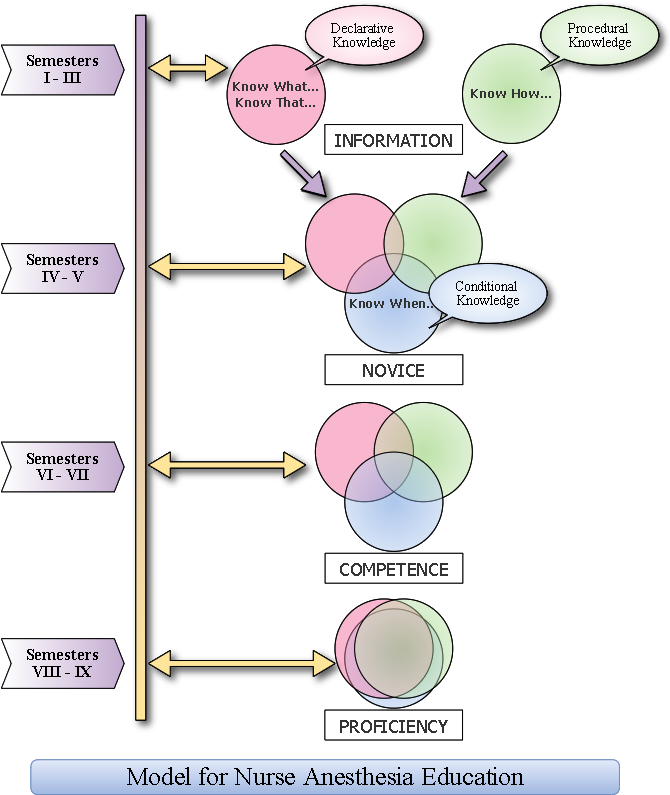Preceptor Clinical Information
To: Preceptors and Clinical Coordinators
From: Nurse Anesthesia Program Director and Faculty
This preceptor guide provides important information for you to use in your daily interactions with the students. If you have any suggestions that would make the clinical experiences, or this guide, more useful please share these with the College of Nursing Nurse Anesthesia Program faculty. We appreciate all the time and expertise you share with our students.
Maura S. McAuliffe CRNA PhD FAAN
Clinical Curriculum
To prepare nurses for a career as Certified Registered Nurse Anesthetists (CRNAs), the Nurse Anesthesia Program faculty subscribe to the belief that learning is a developmental process through which declarative, procedural and conditional knowledge bases are developed and refined in a developmental fashion. We also believe that case-based anesthesia instruction allows students to acquire flexible knowledge structures required to apply theory to practice.
The students begin their educational process by taking the basic science foundational courses that include anatomy, physiology, chemistry and physics and pharmacology. These are taught by professors who are experts in these subjects. The pharmacology and physiology courses are taken with the medical students in the Brody School of Medicine.
- The physiology course contains subject-appropriate labs and a full 5 s.h. anatomy course including a cadaver lab. Students perform dissections enabling them to understand the various anatomical planes that guide the tasks associated with anesthesia practice such as insertion of central lines, subarachnoid and regional anesthesia blocks.
- The clinical correlations course accompanies anatomy to form links to clinical application.
The applied science courses are designed to incrementally build upon the basic sciences. These courses include the basic and advanced principles of the applied science of nurse anesthesia in the classroom and clinical area. Simulation is incorporated throughout the program.

The clinical curriculum is where, through case-based instruction, preceptors help students link procedural and declarative knowledge learned in basic and applied science to clinical application. This is an essential element of their education process. The East Carolina University College of Nursing Nurse Anesthesia Program has established important student preceptor relationships that allow students to have the opportunity to integrate these knowledge bases and practice newly acquired skills under the guidance of expert professionals.
- To this end, the Nurse Anesthesia Program assigns students to general surgery and specialty rotations throughout their clinical curriculum. Most of the rotations take place within ECU Health Medical Center (VCM), our flagship clinical site, and it’s associated East Carolina Heart Institute.
- The clinical rotations include an intensive cardiovascular rotation as well as, neurosurgery, obstetrical, pediatric, evenings and weekend rotations and others. When students are in the ECU Health Medical Center the daily assignments are made by the Nurse Anesthesia Director of Clinical Education or their designee.
- Students also have several 1-3 week rotations at the ECU Health Roanoke-Chowan Hospital in Ahoskie, the ECU Health Chowan Hospital in Edenton, the SurgiCenter of Eastern North Carolina in Greenville, and Pain Management Center in Greenville. During these rotations the clinical coordinator or his or her designee make the daily assignments for the students